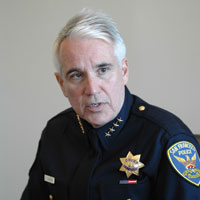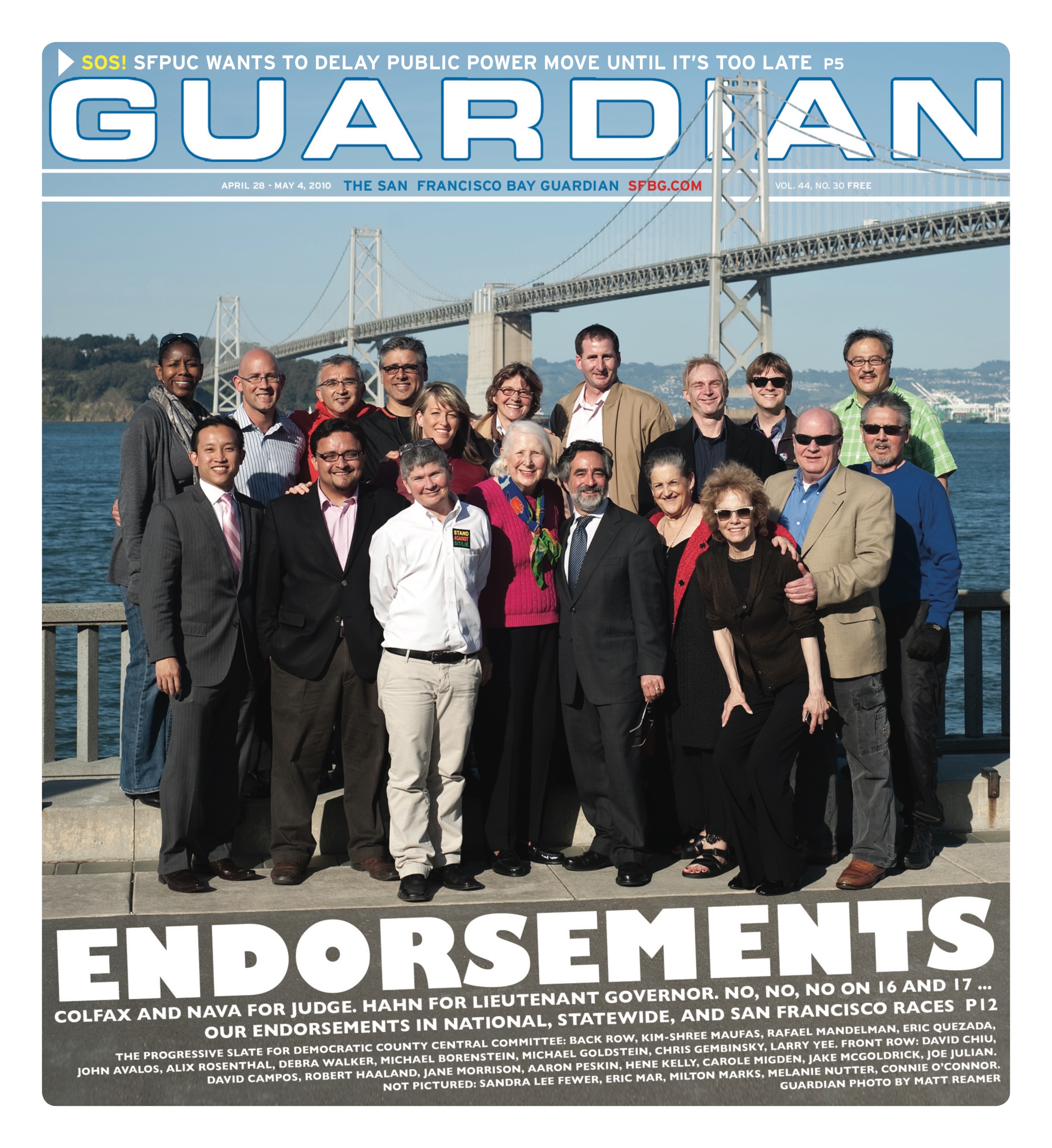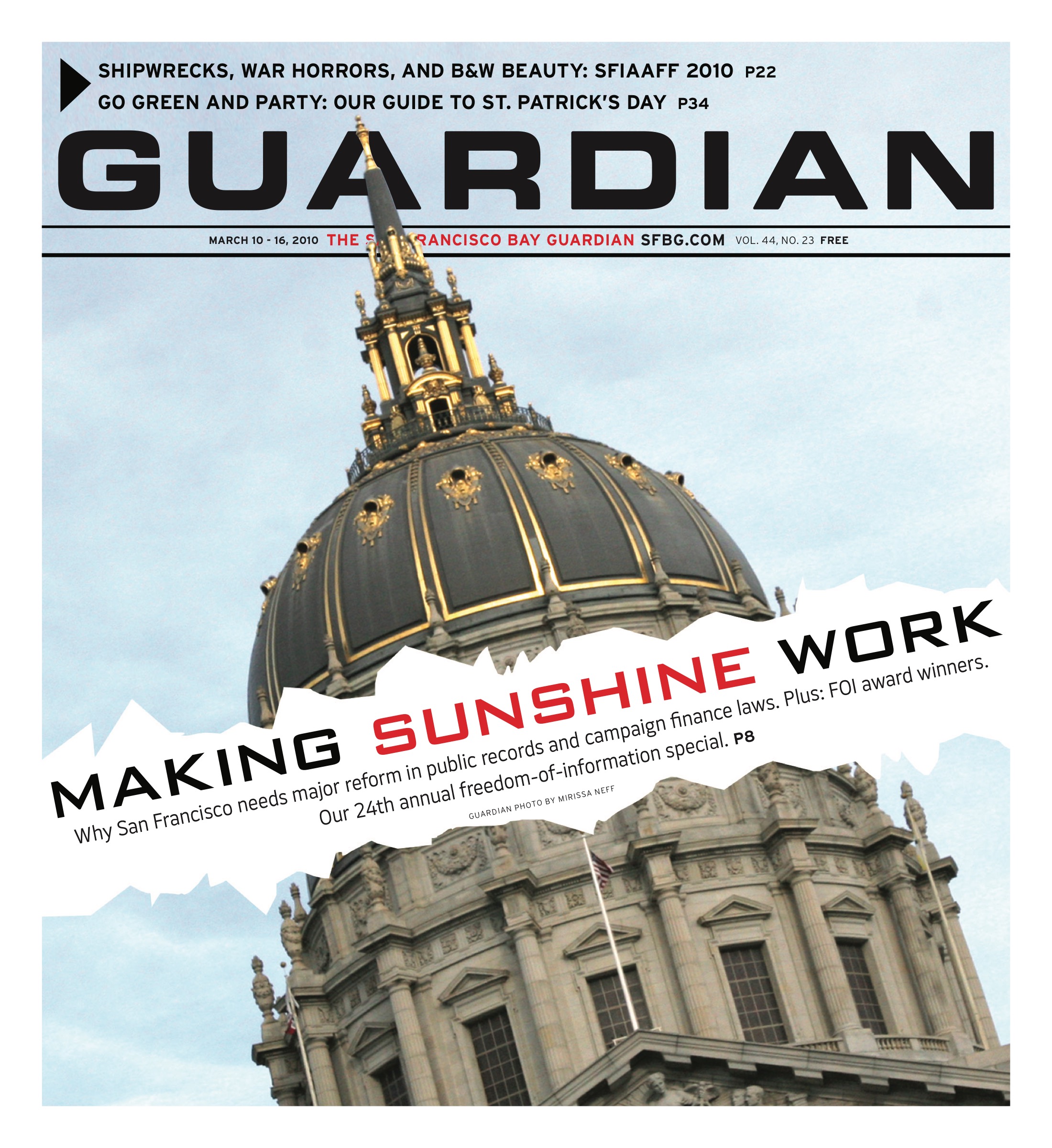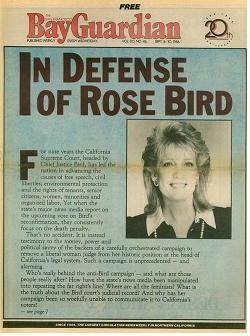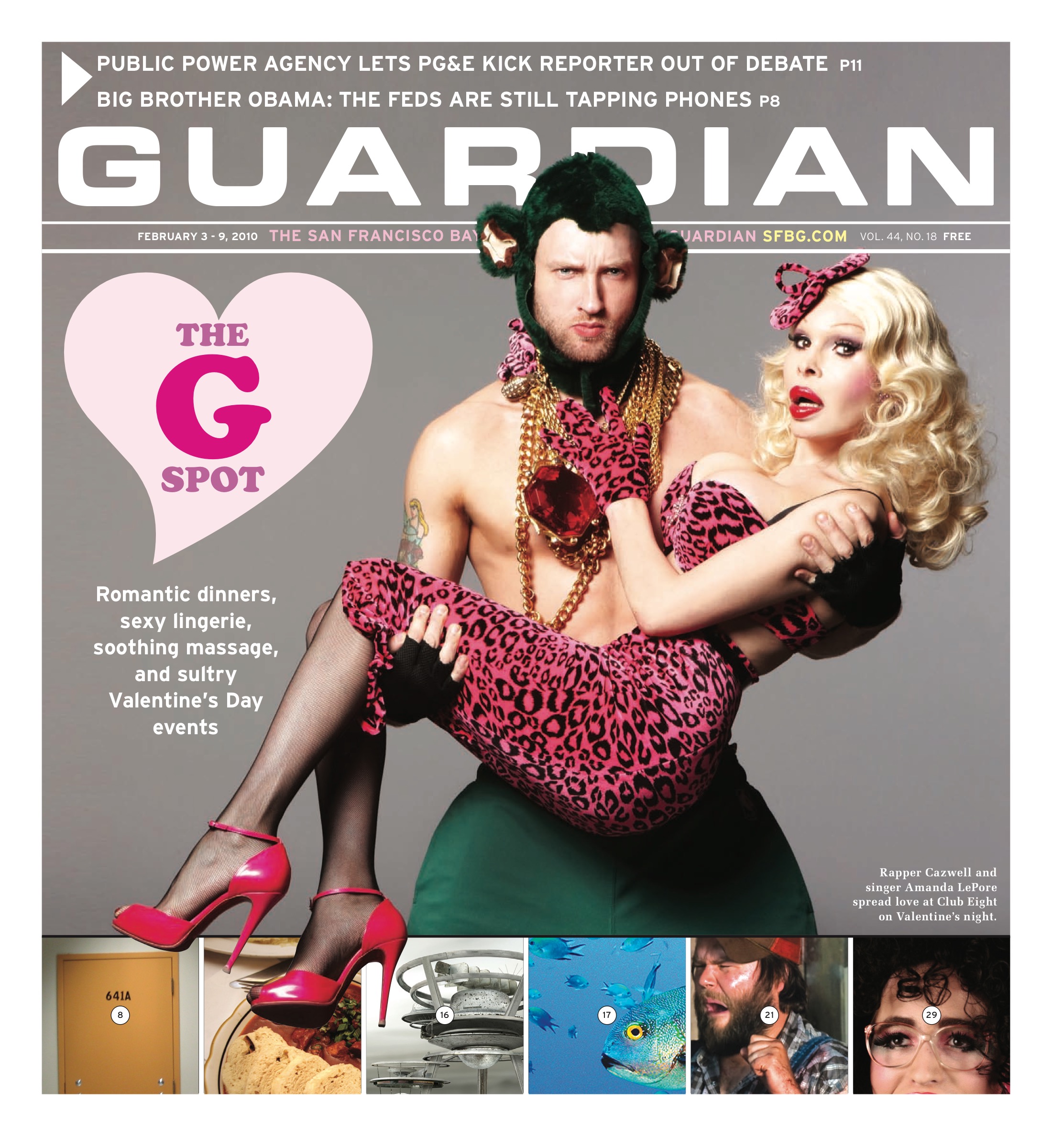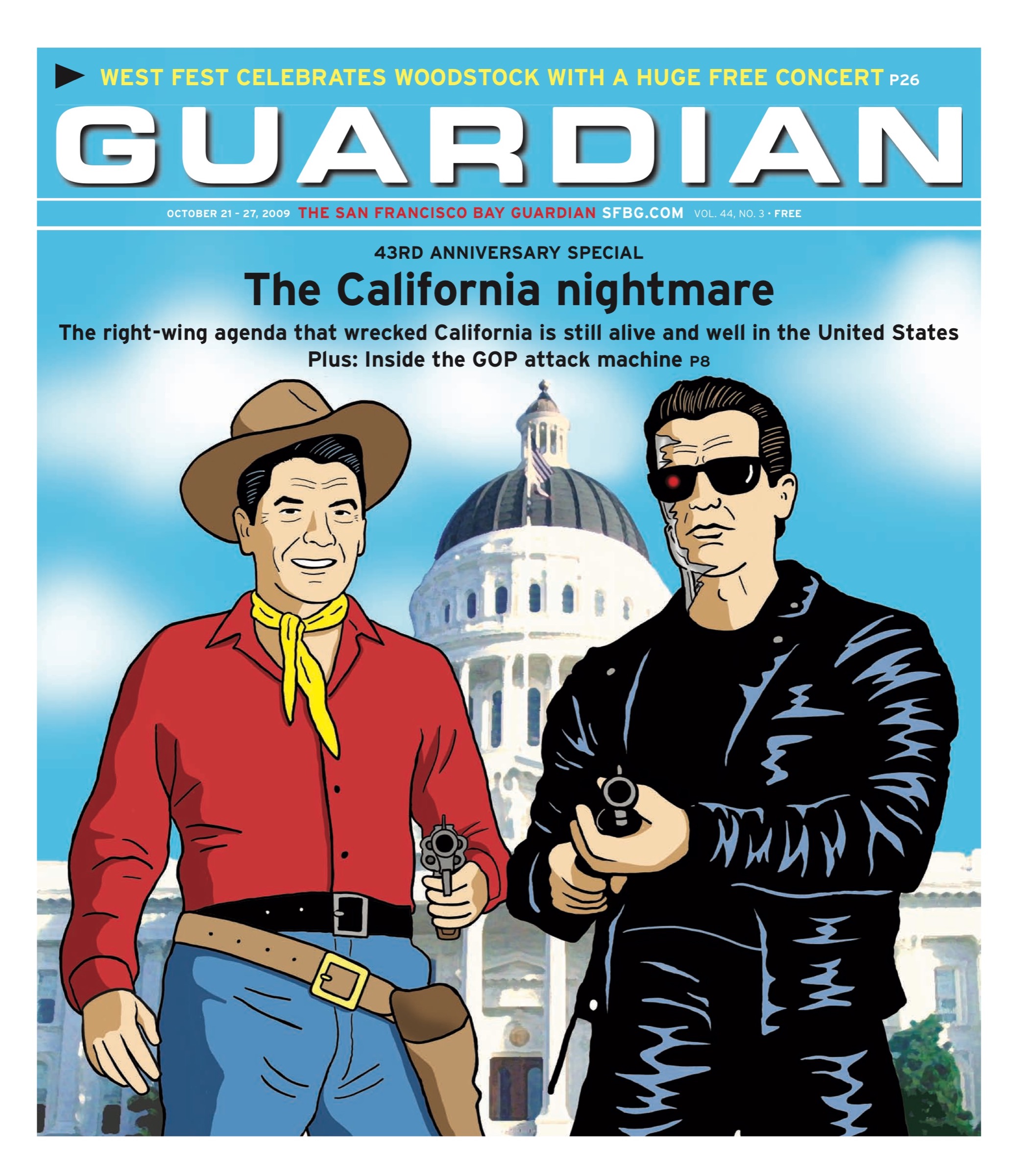news@sfbg.com
Tensions over the issue of how cities and states should treat undocumented immigrants have been simmering in San Francisco since the Board of Supervisors and Mayor Gavin Newsom began clashing over the issue almost two years ago. But they have recently boiled over in response to a draconian new law in Arizona, quickly altering the political dynamics of the issue, here and across the country.
Thousands flooded into the streets of San Francisco’s Mission District on May 1 to march for immigrant rights, part of a May Day celebration that seemed infused with collective outrage at Arizona’s Senate Bill 1070, an anti-immigration measure signed into law April 23 that has touched off a firestorm of protests nationwide.
The predominantly Latino crowd waved American flags and flew banners denouncing the law, which makes it a state-level crime to be in the country illegally and criminalizes the failure to carry immigration documents at all times. The march occasionally erupted into chants of “Si Se Puede!” (Yes we can), and “Obama, escucha: estamos en la lucha,” (Obama, listen: We’re in the struggle).
While immigrant rights marches are held every year on May 1, the 2010 rallies had a tremendous turnout. San Francisco’s immigrant rights movement seemed galvanized by the new legislation, which is widely perceived as racist and ill-advised. Yet it has also been seen by advocacy groups as an opportunity for federal immigration reform.
Despite the cultural and geographic chasms separating San Francisco and Phoenix, SB 1070 also has emerged as a pivotal issue in a big election year as Latino and progressive communities gauge politicians’ reactions to a bill that has made national headlines.
San Francisco was the first city in the country to call for a boycott of Arizona. But Newsom proved out of step with City Attorney Dennis Herrera and Sup. David Campos, who first independently called for the boycott. While Campos and Herrera sent a clear message urging city departments to boycott Arizona-based companies, Newsom warned of the “complicated” aspects surrounding this idea then put forth a proposal to form a working group to analyze the idea.
“What we need is action, swift action,” Campos told the Guardian when we asked what he thought of Newsom’s plan. “We did not need a working group deciding whether or not to do same-sex marriage. We don’t need a working group to tell us what we should do here.”
SPEAKING OUT
Campos delivered a rousing speech, in Spanish, at the May 1 rally at Civic Center Plaza, saying San Francisco had to send a clear message to Congress and emphasizing his support for a boycott. As he spoke, the high-energy, tightly packed crowd waved flags, banged on pots and pans, cheered and applauded.
Ramon Cardona, a Salvadoran who directs a San Pablo immigrant outreach organization called Centro Latino Cuzcatlan and helped organize the event, said the underlying message was to urge Congress to pass comprehensive immigration reform. “Deportations are creating so much suffering and pain,” he said. “The captures and deportations are dividing up families, and leaving children as orphans.”
Cardona noted that the number of people getting deported has increased — in 2006, more than 180,000 deportations were carried out; U.S. Immigration and Customs Enforcement (ICE) has declared a target of 400,000 for this year. But Cardona said he doubts if crackdowns or intensified border militarization would deter those with an eye toward illegally crossing the U.S. border because the economic conditions in Central America have decimated most alternative means of earning a living.
“If globalization policies were not so unbalanced, millions of campesinos [country people] and workers would not be in a position right now where they had to leave their families in order to work,” Cardona said. “When you have armies of unemployed people without a prospect … people will take desperate measures.”
Giselle Perez, a young woman who participated in the rally, said she was there in support of workers who risk their lives to come to the U.S. “As a child of immigrant parents, I feel our attention should be toward the forces that have created this destruction, and we shouldn’t be persecuting those … who are just coming here to work and to provide the services that we all benefit from,” Perez said.
But even in San Francisco, there were signs of how divisive the immigration issue is. As speakers and hip-hop groups took turns onstage at Civic Center Plaza, a crowd of at least 20 counter-protesters set up camp across the street in front of City Hall, standing behind police barricades and displaying banners which read “We need more ICE at this fiesta” and “Golden Gate Minute Men.”
A self-proclaimed white separatist organization calling itself the Bay Area National Anarchists (BANA) — pinpointed as a hate group by the Southern Poverty Law Center and bitterly hated by local anarchists — made its presence known. A scuffle occurred when BANA members wound up in a physical clash with a group of individuals as they left the rally, resulting in two arrests.
In the wake of the boycott announcement, Herrera was deluged with angry e-mails from throughout the country, expressing angry sentiments toward “illegal aliens” and threatening to boycott the city of San Francisco.
CHANGING DYNAMICS
SB 1070 empowers police officers to detain and arrest anyone they have “reasonable suspicion” to believe is in the country without immigration papers. The bill makes transporting and employing undocumented immigrants a crime. And it allows individuals to sue municipalities where they believe law enforcement is not pursuing undocumented immigrants.
Reactions to the Arizona law continue to reverberate nationwide. And the uproar has forced the debate about federal immigration reform into the headlines and created a string of potential pitfalls for politicians just ahead of the 2010 elections.
President Barack Obama immediately called the law “misguided” and ordered the U.S. Department of Justice to determine whether the new law violates people’s civil rights. Former Arizona governor Janet Napolitano — whose January 2009 decision to resign to become Obama’s Homeland Security Secretary caused then-Lt. Gov. Jan Brewer, a Republican, to ascend to the state’s top post — framed SB 1070 as a “cry of frustration” from state and local officials who need federal immigration reform.
“They’ve already amended the law over the course of the week, so even the Arizona Legislature is starting to recognize there are problems,” Napolitano said last week.
But the amended bill, which is scheduled to go into effect later this summer, has already opened up a Grand Canyon-sized rift within the Republican Party: GOP officials in at least seven other red states, including Texas, Colorado, and Oklahoma, have vowed to introduce similar legislation. Their pronouncements have forced even some conservative Republicans like strategist Karl Rove to make statements critical of the law.
In Phoenix, opponents of SB 1070 smeared the state building with swastikas made of refried beans. Around the nation, online social media networks rocked with a gale-force response. More than 1 million SB 1070 opponents banded together on a dozen Facebook pages clamoring for boycotts, a demand championed by a galaxy of civil liberties groups.
San Francisco political consultant Bob Brigham circulated an online petition urging California’s state pension fund to divest from Arizona. “I started thinking about the State of California’s role in helping end apartheid by pulling money out of South Africa,” Brigham said in an online statement. “Then I knew the move.”
The reaction to SB 1070 turned out to be a litmus test on leadership in San Francisco. Herrera, whose father is from Colombia, and Campos, who was born in Guatemala and came to the U.S. as an undocumented youth, separately called for a boycott of Arizona within days of the law’s approval.
But Newsom, in what turned out to be a major political miscalculation, waffled, first questioning the wisdom of a boycott, then scrambling to take baby steps when his opponent in the Democratic primary for lieutenant governor, Los Angeles City Council member Janice Hahn, authored a boycott resolution.
“The notion of boycotting a state and every business that does business in the state is an extraordinarily complicated matter,” Newsom said in an April 27 San Francisco Chronicle article.
That was the day Hahn held a press conference calling for L.A. to cut off all business ties with Arizona.
Seven L.A. City Council members and L.A. Mayor Antonio Villaraigosa endorsed the measure — and Hahn was invited to be a keynote speaker at a May 1 immigration rally in downtown L.A.
Newsom swiftly sought to save face, issuing a press release shortly after Hahn’s announcement stating that he had hatched a “smart, effective” response to the Arizona legislation: the mayor was immediately banning official city travel to the state, with exceptions for essential travel related to law enforcement and public health or safety.
Mayoral spokesperson Tony Winnicker told the Guardian that he did not have information on how much the city travels to Arizona. “Travel has been cut significantly, of course, because of the city budget situation. But Henry Alvarez from the Housing Authority did cancel a trip to Scottsdale set for this weekend for a housing authority conference,” Winnicker said.
Deputy Controller Monique Zmuda estimated that when it came to the annual number of official trips to Arizona, “I would doubt that it would be more than just a handful.” San Francisco has made payments to 81 companies headquartered in Arizona since 2007, totally roughly $16 million, according to a list compiled by the city purchaser.
But it was the message that seemed to matter more than the actual impact on Arizona, at least for the politicians involved.
Newsom also announced plans to assemble a working group to analyze the impact of potential boycott measures against Arizona. The working group includes city Purchaser Naomi Kelly, Controller Ben Rosenfield, Treasurer Jose Cisneros, Theresa Sparks of the Human Rights Commission, representatives from the City Attorney’s Office, the mayor’s Director of State and Federal Legislative Affairs Nancy Kirshner-Rodriguez, and Newsom’s Latino Community liaison Joaquin Torres.
“The purpose of the workgroup is to develop boycott recommendations that are smart and effective and that won’t hurt SF businesses and residents or hurt those who are the victims in Arizona of this terrible law,” Winnicker said.
City Attorney Matt Dorsey took offense at the implication that Herrera’s boycott call was premature or motivated by his own mayoral ambitions. “Dennis was thinking about doing this as early as April 23 because of the outrageousness of the legislation,” Dorsey said.
Michael Trujillo, Hahn’s campaign manager, faulted Newsom’s waffling. “If Arizona legalizes slavery, is he going to form a working group?” Trujillo asked. “It wasn’t a question of whether [Hahn] would do it or not do it. In L.A., it’s a no-brainer. In San Francisco, it requires a working group.”
The incident also served as a vivid reminder to those who support immigration reform and the city’s sanctuary city law that Newsom hasn’t been on their side for a long time.
OPENING OLD WOUNDS
Immigrant rights advocates are expressing renewed concern about Newsom’s failure to implement a Campos-authored and board-approved amendment to his policy on turning juvenile immigrants over to federal authorities before they’ve had their day in court.
Since Newsom ordered his new policy, more than 160 youth have been referred to federal immigration authorities for possible deportation. As a result, kids who subsequently see all felony charges against them dismissed or reduced, find themselves ripped from their families and in danger of being deported.
Advocates also noted that they have not seen any evidence that language they believe is an open invitation to racial profiling has been removed from the mayor’s policy, which Newsom ordered without public review in July 2008, the day after he announced his failed bid to become the next governor of California.
Juvenile Probation Department Chief William Siffermann assured the Guardian in March that such language was being removed following a contentious March 4 hearing. Campos questioned the JPD chief about the origin of language in Newsom’s policy. The language states that in determining whether there is reasonable suspicion that youth is undocumented, one of the criteria listed is the “presence of undocumented persons.”
Siffermann replied that the policy was based on review and approval of the City Attorney’s Office.
Campos asked if Siffermann could see “how something as open-ended as this could lead to racial profiling?”
“It could,” Siffermann replied. “It requires vigilant oversight. If that criterion was taken alone, we’d have a problem with that.”
That concern echoes those of critics of the Arizona law, which purports to ban racial profiling while requiring police officers who suspect people of being an undocumented immigrants to ask for their citizenship papers. Those parallels are uniting San Francisco officials on the otherwise divisive issue.
Tensions arose between Campos and Herrera’s office following Newsom’s refusal to implement Campos’ due process amendment for immigrant youth, with Campos and immigrant advocates saying Herrera should do more to force its implementation. Now Campos said a renewed push for action could be the silver lining in Arizona’s otherwise bad legal situation.
“I think there has been a respectful disagreement between my office and Herrera’s about just how far they could go,” Campos said. “We believe the city attorney can and should advise Newsom that the Mayor’s Office doesn’t have the authority to do what he is doing [requiring probation officers to notify ICE when juveniles suspected of being undocumented are arrested, in violation of Campos’s legislation]. But I appreciate what the city attorney is doing around Arizona.”
Campos and Herrera note that a boycott proved to be an effective model in forcing Arizona to rethink its refusal to observe Martin Luther King Jr. Day, 20 years ago.
Asked if Arizona’s SB 1070 will change the national immigration debate and the city’s local policy toward immigrant juveniles, Herrera said, “I don’t think anything with respect to the state of our immigration laws could get any worse. Otherwise, we’ll probably end up with draconian policies being put forward by other states.”
Herrera also believes the national debate could allow quicker implementation of San Francisco’s sanctuary city reform, telling us, “Obviously the debate will provide the vehicle to have the discussion to clarify the distinctions between state and federal law.”
Angela Chan, staff attorney at the Asian Law Caucus, an immigrant advocacy group, hopes the outcry in San Francisco and throughout the country will be the match that lights the fire for humane and comprehensive immigration reform. “We can no longer wait and allow states and local governments to try — often foolishly, like in the case of Arizona — to take matters in their own hands,” she told us.
Chan sees parallels between Arizona and what happened during the civil rights movement when police attacked African American demonstrators in Birmingham, Ala. “When there is gross injustice, the hearts and minds of Americans are moved by these images now, as they were then,” Chan said. “I do believe comprehensive immigration reform will come about, if not now then very soon, as a result.”
But she notes that what is happening in Arizona is not isolated.
“In San Francisco, for almost two years now, we have had a policy instituted by Mayor Newsom that requires probation officers to report youth to ICE based only on ‘reasonable suspicion’ that they are undocumented,” Chan explained, echoing language from the Arizona law. “The good news is, with the mayor’s strong stance against the Arizona bill, it is an opportunity for him to reevaluate his own policies in San Francisco and do the right thing here. San Francisco can and should be a leader on immigrant rights.”




